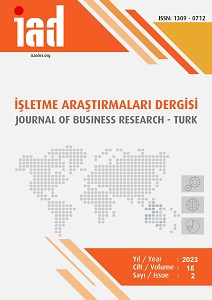Basel Uygulamalarının Doğuşu ve Türk Bankacılık Ekosistemi Üzerindeki Etkileri
The Birth of Basel Practices and Their Effects on the Turkish Banking Ecosystem
Author(s): Sadık Serçek, Enes GüloğluSubject(s): National Economy, Supranational / Global Economy, Economic history, Economic development, Financial Markets, Globalization
Published by: İşletme Araştırmaları Dergisi
Keywords: Basel Criteria; Basel I Criteria; Basel II Criteria; Basel III Criteria; Turkish Banking System;
Summary/Abstract: Purpose – The aim of this study is to chronologically examine the effects of globalization, which started in the 20th century, on the world economy, to explain the determined regulations including the emergence of the Basel criteria and the measures that the banking sector should take against possible risks, the implementation stages of these regulations in Turkey and the financial situation in Turkey. The aim is to give information about the compliance processes of the system to the determined criteria. In this context; Firstly, explanatory information about Basel I, Basel II and Basel III Criteria was given, and the deficiencies and criticisms of the criteria that emerged in line with the crises experienced afterwards were included. In addition, information was given about the positive and negative situations experienced in the harmonization processes of the Turkish Banking System to all Basel criteria published. Design/methodology/approach – In this study, the change and development of the economic structure throughout the world since the 1800s and 1900s were examined and the economic picture in the world in the process until the establishment of the Basel Committee was tried to be depicted. Information has been given about the causes and consequences of the crises in the world economic system with globalization, and the comparison of the data in the international banking sector and the data in the Turkish banking sector has been examined according to the method of comparative analysis by establishing relations between the main macroeconomic variables. The focus of the study is on the capital adequacy ratios and loan volumes of banks. Findings – It has been more clearly understood as a result of the strong financial crises that have occurred in the last century and the last two decades that the banking system, which is considered the most important elements in the financial ecosystem, is the biggest risks exposed to capital adequacy and liquidity risks. Various depressions and crises in the 1900s, the crisis in our country in the period 2000-2001, and the crisis that started in the USA in 2007, which had a global impact, revealed the necessity of much more important capital adequacy studies for the banking sector, as well as other market regulations. Discussion – As a result of the research; Before the Basel Criteria, information was given about the state of the world economic system, after the Basel Criteria, the effects of Basel applications on the banking sector, which is the carrier structure of the Turkish financial sector, were evaluated, and this research was supported by the numerical data published by the BRSA and TBB. While evaluating the effects of Basel I, Basel II and Basel III articles on the Turkish financial system, the financial data of the banks and the minimum capital adequacy in detail were taken as a scale. As a result of the research, it has been concluded that the financial system in Turkey is in a more robust structure in terms of capital adequacy in line with the measures taken after the 2001 crisis and does not have any problems in compliance with the Basel Criteria.
Journal: İşletme Araştırmaları Dergisi
- Issue Year: 15/2023
- Issue No: 2
- Page Range: 1336-1354
- Page Count: 19
- Language: Turkish

